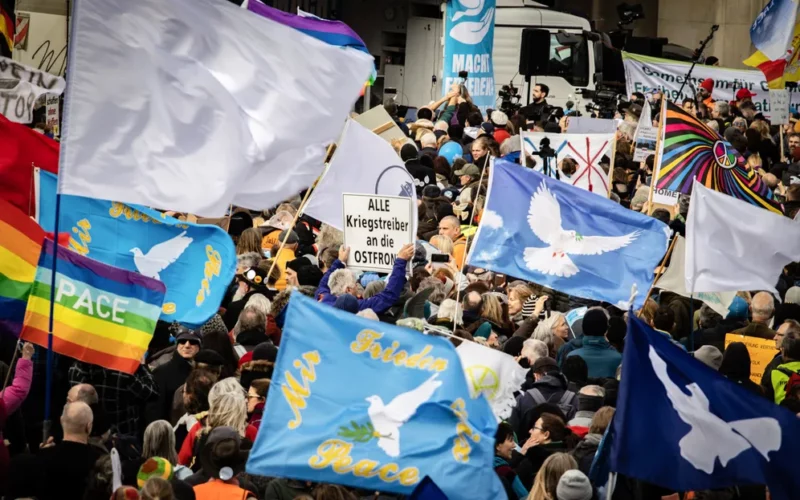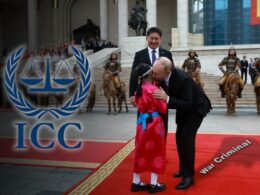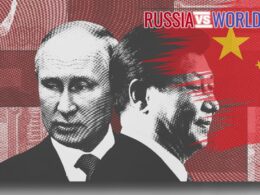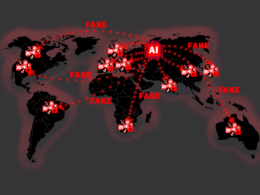Today, we once again discuss the rise of social tension in Germany, as the extreme right-wing voices become louder, while Russia intensifies its efforts to undermine the country’s social and political situation. The issue is discussed in the article that appeared on DER SPIEGEL. The main role in this article is assigned to Sahra Wagenknecht, about whom there were many references in our previous materials.
Putin’s war in Ukraine is unsettling many in Germany. A new peace movement is forming in the country, but it is stirring up the ghosts of German history – and has an open flank to the extreme right.
No, she says, she’s not a “Putin sympathizer.” And she has nothing at all to do with right-wing agitators. Antje Döhner-Unverricht sees herself as one of many in Germany who long for an end to the war in Ukraine, a segment of the German population that feels politicians are doing too little to make that happen.
So, the 52-year-old from Dresden took action: She signed the “Manifesto for Peace” organized by German author and feminist leader Alice Schwarzer and the far-left Left Party politician Sahra Wagenknecht. The “manifesto” calls on German Chancellor Olaf Scholz to support negotiations between Russia and Ukraine. “A compromise with Putin is by no means the capitulation of democracy,” says Döhner-Unverricht. She speaks calmly and reflectively.
As a psychologist, some of those to whom she provides care are traumatized patients who “are very worried about the current state of war and are having a hard time dealing with it.”
“My daily work is about ensuring that we maintain the dialog with one another,” says Döhner-Unverricht. “That dialog is currently missing from the political landscape.”
The Dresden psychologist opposes arms deliveries to Ukraine. “Russia wants to win the war by any means necessary,” she says. “We keep escalating it, where will it end?”
Almost every second person in Germany shares Döhner-Unverricht’s view. German society has been divided ever since Russian President Vladimir Putin invaded Ukraine a year ago. Some are in favor of supplying weapons to Ukraine. Others are opposed – sometimes more and sometimes less strongly – because they fear it could escalate the war and make it go on forever.
Open letters have been published for and against Germany’s role in the war, with prominent supporters for each argument. But the “manifesto” brings a new dimension to the debate.
What is happening now, namely the attempt to establish a new peace movement, hasn’t been seen in Germany in years. More than a half-million people have signed Schwarzer’s and Wagenknecht’s “Manifesto for Peace,” while over the weekend, major protests were held across Germany in support of the manifesto, with at least 13,000 taking to the streets in Berlin alone.
Right-wing extremists mobilized diligently in recent days to hijack the marches. People like Antje Döhner-Unverricht, who distance themselves from Germany’s far-right Alternative for Germany (AfD) party and from Putin’s propaganda on the petition platform and in comments to DER SPIEGEL, want nothing to do with them. They say they are uncomfortable with the idea that right-wing extremists share their position.
But the issue is too important to them to shun involvement just because of the interference from the right wing. With the result that it’s hard to tell who comprises the bulk of the manifesto’s signatories: moderates or radicals.
In the manifesto, Wagenknecht and Schwarzer warn of a “world war” and “nuclear war” and call on the chancellor to “stop the escalation of arms deliveries” and to work for “peace negotiations” between Ukraine and Russia.
What’s lacking in the petition, though, is a coherent explanation of how negotiations might look with someone like Russia’s president, who clearly isn’t interested in negotiations.
Wagenknecht and Schwarzer have been criticized for their initiative because it lacks clear language distancing itself from the right. Some of that criticism comes from Wagenknecht’s own Left Party, but a number of the initial signatories to the manifesto have begun backing away from it.
Theologist Margot Kässmann, the former head of the Protestant Church in Germany, continues to support the “manifesto,” but said last week she would not attend demonstrations in support of the movement in Berlin. “There are attempts by the right-wing fringe to hijack criticism of arms deliveries,” Kässmann says, lamentingly. “I care about who I am associated with.” The AfD, for example, whose chair Tino Chrupalla recently shared Wagenknecht’s and Schwarzer’s petition on Twitter, represents “inhuman views,” says Kässmann. “I don’t want to be associated with them,” Kässmann says. “Let them hold their own demonstration.”
Meanwhile, Roderich Kiesewetter, a politician with the Christian Democratic Union (CDU), has launched his own counter-initiative as an alternative to that of Schwarzer and Wagenknecht. In it, he and other signatories write: “Hundreds of thousands of Ukrainian women and children in this country, whose husbands, brothers and fathers are fighting on the battlefield right now, are shocked at these ideologues who insist on ‘peace’ by manifesto, whatever the cost might be.”
Also, The leaders of the CDU and the Free Democratic Party (FDP), Johannes Winkel and Franziska Brandmann created the same appeal for support of Ukraine in response to the petition of populists.
“There are people in our country who are now calling to stop arms supply. They emphasize that they demand this because they are committed to peace. They pretend that they are acting out of mercy towards Ukrainians. (…) All this is wrong,”
The debate shows that more than 30 years after the fall of the Berlin Wall, Germans still don’t know who they want to be. American historian Timothy Snyder, who is one of the best and most argumentative experts on Ukrainian history, gave a long interview to the “DER SPIEGEL”. This article is devoted to the war in Ukraine, namely the role of Germany in it.
A recent survey conducted by the online polling institute Civey on behalf of DER SPIEGEL demonstrates just how divided Germans are.
- As many as 63 percent of those surveyed believe that the German government should do more than it has to promote peace negotiations between Ukraine and Russia.
- The Germans, though, are not in favor of peace at any price. Some 42 percent of respondents say that the goal of negotiations should be the restoration of Ukraine’s borders before the 2014 annexation of Crimea.
- Thirty-three percent say Ukraine should demand the restoration of its national borders as they were prior to the Russian attack in 2022.
- Only 17 percent are in favor of the Ukrainians ceding any additional territory.
When a number of German politicians, supported by a significant share of the German public, began demanding in January that Scholz deliver battle tanks to Ukraine, Schwarzer sent an email to Wagenknecht suggesting that they start a joint petition and organize a demonstration to take place at the Brandenburg Gate in Berlin. They initially attracted 69 signatories, including some prominent German public figures like Kässmann, Peter Gauweiler, a prominent former politician with the center-right Christian Social Union party, former European Commission Vice President Günter Verheugen, the German actress Katharina Thalbach and musician Reinhard Mey.
Did Schwarzer & co. know exactly who they were getting involved with when they engaged with Wagenknecht? She’s criticized for accepting support from right-wing extremists & appealing to them, and is seen as a luminary in the “Querfront,” a left-right extremist alliance.
No “Ideology Test”
Shortly after the launch of the initiative, Wagenknecht’s husband Oskar Lafontaine, a former political star in Germany, was one of those who fed such suspicions. He gave an interview to Milena Preradovic, a former presenter with the mainstream television network RTL who now has a YouTube channel that is extremely popular with conspiracy theorists and the extreme right. She asked Lafontaine if it was possible that AfD politicians and right-wing voters might also attend the demonstration. He stressed that there is no “ideology test” for those wanting to come out.
Wagenknecht has long had links to the “Querdenker,” a protest movement that was adamantly opposed to measures to contain the coronavirus outbreak and also doesn’t shy away from conspiracy theories or the right-wing fringe.
During the Russia’s 2014 invasion of Ukraine, she signed an appeal of what was called the “Peace Winter” initiative. Among those who attended the demonstrations back then were the German conspiracy theorist Ken Jebsen and well-known neo-Nazis. Wagenknecht was still the national leader of the Left Party at the time. After massive protests within her own party, Wagenknecht canceled her participation in one of the demonstrations.
Now, the question of Wagenknecht’s dubious alliances is once again front and center. Indeed, the same actors who emerged during the 2014 Peace Winter are now resurfacing behind Wagenknecht. They include Jürgen Elsässer, the editor in chief of the far-right magazine Compact, which promoted participation in Wagenknecht’s demonstration. Wagenknecht and Elsässer have known each other for years. In 1996, when Elsässer was still part of the left-wing spectrum, the two co-authored a book together. Wagenknecht’s close supporters include Diether Dehm, a music producer and former member of parliament with the Left Party who describes himself as a “conspiracy theorist.”
Wagenknecht Fans in the AfD
The national leadership of the AfD is particularly pleased with Wagenknecht’s involvement. The internal assessment by members of the extreme right is that the demonstration initiated by Wagenknecht and Schwarzer would be of enormous help to the AfD because the left has repeatedly distanced itself from Wagenknecht, and anyone still sharing her positions would have little choice but to vote for the AfD.
Some AfD officials have begun realizing the dangers of associating too closely with Wagenknecht. People like Sahra Wagenknecht are “competitors of the AfD,” the head of the state party chapter in Saxony-Anhalt recently wrote to members in an email.
Such statements are closely monitored within the party. The fact that Wagenknecht’s camp has long been considering the creation of a new party only intensifies such discussions. And recently, there was a corresponding statement from Sahra.
Wagenknecht has been dodging questions for months about speculation that she is planning to splinter off from the Left Party. In the background, though, considerations have long been underway regarding how a new party could get off the ground before the 2024 European elections. The biggest problem is organizational ability: An earlier movement organized by Wagenknecht, “Stand Up,” ended in chaos.
But the “Manifesto” is no longer just an issue for the right-wing or left-wing fringes. Beyond the extremists, conspiracy theorists and Wagenknecht fans, there are countless people who share the desire for a rapid peace through negotiations.
“Not Falling into a State of Helplessness”
Green Party politician Winfried Nachtwei, 76, recently completed an article on German atrocities in Ukraine in 1941. According to him, “There is also a desire to never be defenseless again. This is also a lesson from the German extermination mania and World War II. This is ignored by many who profess to be pacifists. Nachtwei accuses Schwarzer and Wagenknecht’s supporters of “appeasement in the middle of a war of aggression.”
Young members of the Green Party hold largely similar views of the situation. “I can fully understand the emotional response. Everyone wants peace,” says Jamila Schäfer, a 29-year-old member of parliament. “But some people confuse the pacifist objective with the pacifist method.” Schäfer also considers herself to be a pacifist. “But I am not going to resign myself to falling into a state of desperate helplessness as soon as an aggressor starts a war.”
Scholz also has a clear message for the drafters of the “Manifesto.” “I don’t share the convictions of this appeal,” the chancellor told the German political talk show host Maybrit Illner on Thursday. But he also promised the Germans: “What I am really committed to is doing the right thing at this time. I am committed to not being rushed, to avoiding misguide, hasty decisions, to refraining from things that everyone regrets afterwards. Rather, I am committed to making sure our country gets through this difficult time.” Scholz likes to say that there’s no script for this war.








